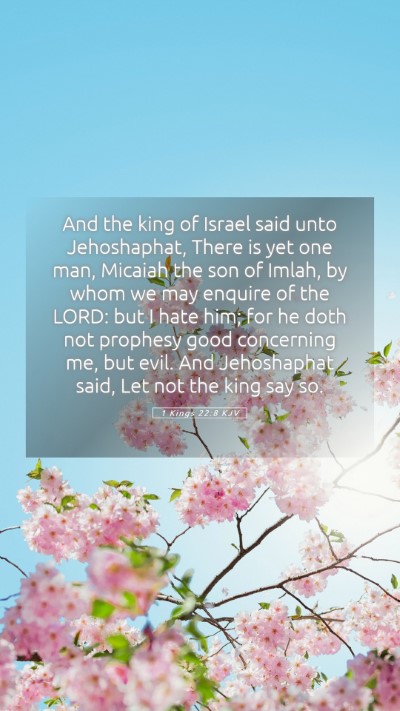Understanding 1 Kings 22:8 - A Comprehensive Commentary
1 Kings 22:8 states: “And the king of Israel said unto Jehoshaphat, There is yet one man, Micaiah the son of Imlah, by whom we may inquire of the Lord: but I hate him; for he doth not prophesy good concerning me, but evil. And Jehoshaphat said, Let not the king say so.”
Summary of Bible Verse Context
This verse occurs within the narrative of the joint military campaign of King Ahab of Israel and King Jehoshaphat of Judah against Ramoth-Gilead. Ahab, expressing his disdain for the prophet Micaiah, reflects the tension between true prophecy and the desire for favorable words. This highlights a common biblical theme of rejecting God’s true messages when they conflict with personal desires.
Commentary Insights
Various public domain commentaries provide depth to our understanding of this scripture:
- Matthew Henry: In his commentary, Henry emphasizes Ahab's rejection of Micaiah, illustrating the moral decay of Ahab's character. He notes that Ahab’s desire for positive prophecies over truthful ones reveals the heart's disposition towards sin and disobedience. Henry suggests that a true prophet often faces opposition when the truth is uncomfortable to those in power.
- Albert Barnes: Barnes provides insight into the character of Micaiah and Ahab's motivations. He explains that Ahab’s hatred for Micaiah stems from the latter’s consistent pronouncements of judgment against Ahab’s actions. Barnes underscores the importance of distinguishing between false prophets, who provide comfort, and true prophets, who adhere to the divine message regardless of popularity or approval.
- Adam Clarke: Clarke elaborates on the political context of this passage, highlighting the importance of prophecy in guiding royal decisions. He remarks on Jehoshaphat’s wisdom in recognizing the value of listening to God’s counsel, even when it is unfavorable. Clarke captures the tension present in the verse—between divine truth and human desire for approval.
Key Themes and Lessons
The verse encapsulates several key themes significant for Bible study insights:
- Discernment in Spiritual Matters: Ahab's attitude reflects a common tendency to prefer soothing messages over uncomfortable truths in spiritual life. This teaches the importance of discernment when seeking guidance.
- Resistance to Truth: The rejection of Micaiah showcases the conflict between God’s truth and human desires. It prompts reflection on how we respond to messages that challenge our preconceived notions.
- Importance of True Prophecy: The presence of Micaiah as a messenger of the Lord emphasizes the vital role of authentic prophets in guiding faith and decisions. True prophecy often leads to necessary self-examination.
- The Role of the King: Ahab’s authority is juxtaposed with Jehoshaphat’s piety, illustrating how righteousness can sometimes stand in opposition to power and influence.
Application of the Verse
In applying this passage to daily life, we are called to:
- Seek wisdom from scripture through various Bible study resources and Bible study guides.
- Be open to hearing truths that may challenge or disturb our peace, understanding that true growth often arises from discomfort.
- Engage in online Bible study groups that encourage frank discussions regarding difficult scriptures.
Related Scripture References
This verse connects with several other biblical passages, enhancing our comprehensive understanding:
- 2 Chronicles 18:7: Illustrates the opposition faced by Micaiah further reaffirming the tension between false and true prophets.
- 1 Kings 22:5: Jehoshaphat’s initial response and desire for a prophet of the Lord enhance the discovery process of discerning biblical truths.
- Jeremiah 23:16: Comments on the prophets who speak peace and the contrast with those who deliver God’s true warnings.
Concluding Thoughts
This Bible verse commentary offers rich biblical exegesis, inviting readers to delve deeper into the meanings behind scripture. Understanding the nuances within 1 Kings 22:8 not only enriches our knowledge but encourages us to actively seek the truths within God’s word, even when it’s challenging. By drawing insights from esteemed commentaries and applying them to our lives, we enhance our Bible verse interpretations and thereby grow in our faith.


